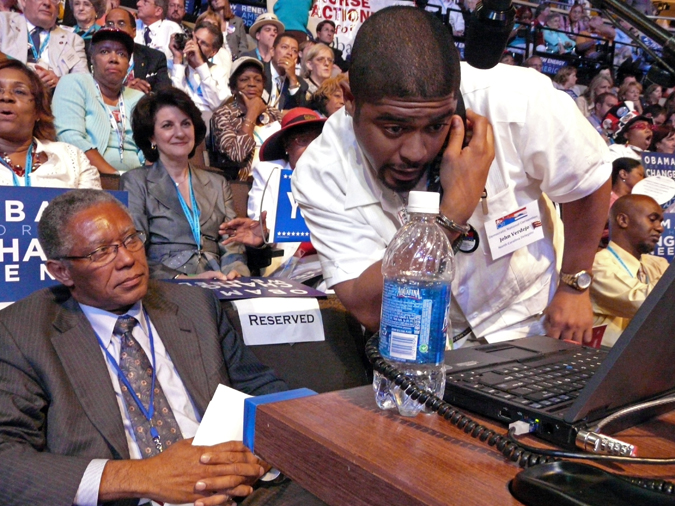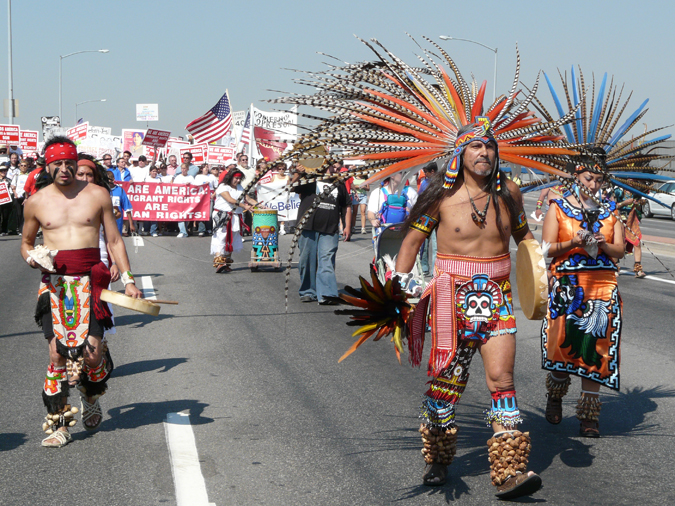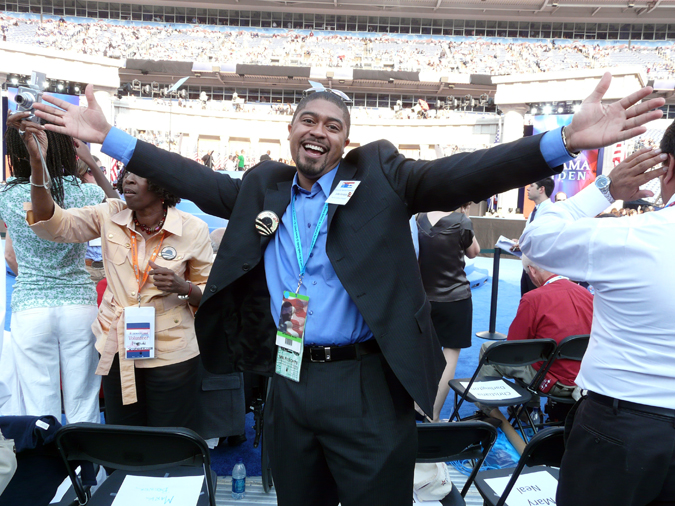An N.C. delegate to the Democratic National Convention, Raleigh’s John Verdejo sees similarities between his personal history and Barack Obama’s.
Originally published in Indy Week.
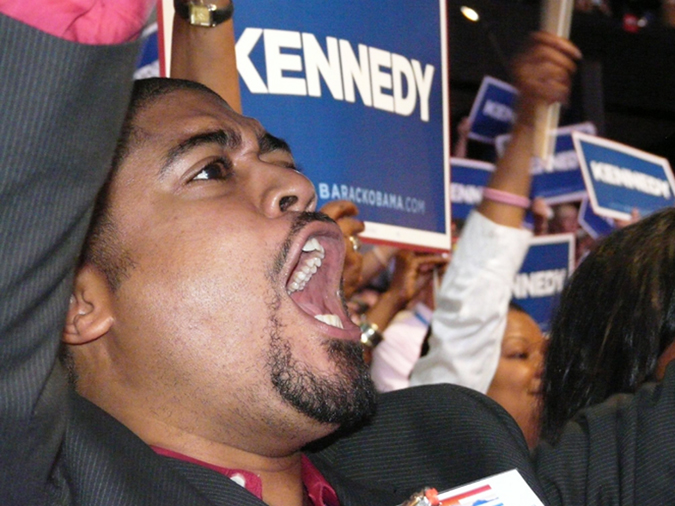
Raleigh delegate John Verdejo: “When I heard Obama’s story, it brought me back to my childhood.” Photos by Barry Yeoman.
UNTIL HIS PLANE TOUCHED DOWN in Denver for the Democratic National Convention, John Verdejo had never in his life reset his watch. The 29-year-old’s personal history was contained entirely within the Eastern time zone: the South Bronx, where he spent his childhood in an apartment without reliable heating; Greensboro, where his mother tried to give him a healthier adolescence; Raleigh, where he works now for a state agency that collects civil penalties from polluters; and Rio Piedras, Puerto Rico, where he occasionally visits the extended family his mother left behind.
When he was chosen as an Obama delegate representing North Carolina’s 13th Congressional District last May, Verdejo could hardly believe his luck. Many of the candidates vying for that slot were accomplished professionals who had worked for years inside Democratic campaigns. Verdejo’s recent political experience totaled three months. “Compared to them,” he blogged at the time, “I have not done much of anything to warrant their attention.”
But Verdejo’s impromptu speech at a district-wide meeting stirred his fellow Democrats, who voted to send him to Denver as one of 134 North Carolina delegates. It’s easy to understand why: Verdejo has a direct gaze and an exuberant smile, and when he speaks he combines sharp analysis with an almost wide-eyed earnestness. As a young man who was raised by a devoted single mother, then got an education while struggling with his place in society, Verdejo also has threads of Sen. Barack Obama’s narrative embedded into his own.
As I covered last week’s Democratic National Convention — the proceedings, the protests, the North Carolina delegation breakfasts — I didn’t exactly follow Verdejo, who would have proven too swift to keep up with. But he did become my touchstone. We talked every day about what energized him and what alienated him, and I watched as good luck singled him out twice.
I chose him for several reasons. First, Verdejo represents an emerging generation of political activists who grew up under Presidents Reagan and Bush Sr. and witnessed cuts in domestic programs and widening economic disparities. Second, as a Latino, he belongs to a demographic that Obama needs to inspire in order to win this November’s election. Finally, Verdejo takes to heart, in a very personal way, the community-empowerment message at the root of Obama’s success — a theme the Illinois senator echoed in last Thursday’s acceptance speech: “What the naysayers don’t understand is that this election has never been about me. It’s been about you.”
“I GUESS IT WAS THE TYPICAL SOUTH BRONX STORY,” Verdejo told me Sunday night, the day before the convention kicked off. We were huddled around a table at a suburban Doubletree Hotel, where the North Carolina delegation was headquartered. Verdejo was easy to spot: He wore jeweled studs in each ear and a cross that lay neatly on his New York Yankees jersey. Among the state’s contingent, he was the visual outlier, and the biographical outlier too.
Verdejo grew up with his single mother who spoke limited English. She worked when she could and collected welfare the rest of the time. What he remembers most about their Bronx apartment was the plywood that covered one of the windows. It was flimsy enough that, in the winter, cold air seeped through. “I remember vividly — and sometimes my mother and I still laugh, just to see how far we’ve come — we would all huddle in her room because it had the only heater,” he said. Outside was even worse. “Just going to school was like that scene in New Jack City where you saw the crack vials on the street,” he said.
Verdejo understood from an early age that his family was on the wrong side of the Reagan-era divide. Watching the news, “it seems like every month they were cutting back on some kind of social program,” he recalled. His mother tried to shield her two sons from the worst of it, and when he was 14 she relocated them to Greensboro. The family moved in with a cousin who lived in a two-bedroom apartment, and his mother eventually found a job at Made Rite Sandwich Co., assembling ham biscuits and pimento-cheese sandwiches for vending machines and convenience stores. Like many North Carolina kids, Verdejo hung out with his buddies, chased girls and went shopping at the mall. But he still followed politics and wondered why the prosperity of the Clinton era didn’t seem to be filtering down. “I found it unfair that, while everyone was getting rich in the ’90s, I still saw my people struggling,” he said.
In 2000, as a college student, Verdejo volunteered for Al Gore’s presidential campaign, registering voters and trying to engage his classmates on the issues. When the U.S. Supreme Court ruled against his candidate in Bush v. Gore, it chased him away from politics. He didn’t return for the 2004 elections. “So many of us were scarred, disgusted, fed up,” he said. “We had no faith in politics and government.”
Meanwhile, Verdejo moved to Raleigh. His mother joined him after the sandwich factory where she worked closed down. She found work in the shoe department at a Wal-Mart, where, her son said, “she has to do the job of three people.”
When the 2008 election cycle started gearing up, “that’s when I started hearing about this guy named Obama,” he said. “When I heard Obama’s story, it brought me back to my childhood. I see him and I see me. I see every other minority who grew up with a single mom. Although he messed up — he did partying, the drugs and whatnot — he got his life together. He’s showing Latino and black men how to be good stand-up men.” Besides, Verdejo said, “we can relate. I mean, the guy listens to Jay-Z. Come on.” Verdejo originally supported John Edwards, who emphasized poverty and corporate welfare in his presidential bid. When Edwards dropped out, Verdejo turned to Obama and became active in local Democratic politics.
NATIONAL PARTY CONVENTIONS ARE NOT FOR THOSE who need sleep. For North Carolina’s delegates, mornings began with 8 o’clock breakfasts, where they heard from elected officials and received their orders for the day. Mid-days were filled with other events: caucus meetings, volunteer opportunities, a tour of Denver’s public transportation system. By late afternoon, delegates started arriving at the Pepsi Center. They listened to, and applauded, hours of speeches before heading out for post-convention parties, some lasting until 2 or 3 a.m.
One of the biggest responsibilities of a delegate is to cheer on demand. The televised part of the convention was carefully orchestrated: Campaign workers ran up and down the aisles, carrying enormous plastic bags filled with identical placards. Delegations received specific instructions: Hold up these signs after the senator speaks, but not before. Get funky when the cameras train on your state. For North Carolinians, this was not always easy. Populist frenzy doesn’t run wild in these parts.
Monday morning, during the delegation breakfast, a Cary woman named Cynthia Marshall stood at a podium and roused the troops. “You’re looking at the first African-American cheerleader at the University of California at Berkeley,” she announced, before dividing the room into two sections for a call and response. “Fired up!” shouted one side of the room. “Ready to go!” shouted the other.
For Verdejo, cheering came easy. “It’s that Puerto Rican thing,” he said. “When you see something that makes you happy, you’ve got to let everyone know.” And happy he was. When he walked into the Pepsi Center for the first time, “I felt like a true Yankees baseball fan when he finally walks into that cathedral of a stadium,” he said. “That’s when it finally hit me: I am a witness to history forever. I mean, forever.”

An Illinois Obama supporter cheers her candidate. The North Carolina delegates were not always as good at visible displays of emotion.
I watched Verdejo’s body language when Sen. Edward Kennedy appeared unexpectedly at the Pepsi Center’s podium, less than three months after doctors removed a tumor from the Massachusetts senator’s brain. As Kennedy promised delegates that “we will break the old gridlock and guarantee that every American — north, south, east and west, young and old — will have decent, quality, affordable health care,” Verdejo rolled a cardboard placard into a megaphone. He bumped hips with the woman standing next to him. “Ted Kennedy is like the godfather for us,” he told me the next day. “You could almost see the changing of the guard from the elder statesman to, now, Barack Obama. Yesterday, he passed the torch.”
In a more local passing of the torch, on Monday three convention whips were named for North Carolina. Their job was to convey instructions from the national campaigns to the state delegates. The youngest of those whips, to his surprise, was Verdejo.
ONE FACET OF THE CONVENTION WAS HARDER for Verdejo to bear: the ubiquitous presence of big business. Remember Cynthia Marshall, the cheerleader? She wasn’t in Denver as a delegate, but rather as the president of AT&T North Carolina, which underwrote Monday morning’s breakfast. Before she led the cheer, Marshall delivered a commercial message for her company: “We are the new AT&T. Our vision is to connect people to their world everywhere they live and work, and do it better than anyone else.” Other sponsors of North Carolina breakfasts included Waste Management, the pharmaceutical firm Merck, and Fidelity Investments. Jerry Meek, chair of the state Democratic Party, announced Tuesday morning that he was trying to score convention passes for the corporate breakfast sponsors.
Nearly everything was branded. The cloth strap that held my press credentials contained 24 logos for Qwest, the “Official Telecommunications Provider” for the Democratic convention (and the Republican one too). That’s not to be confused with Panasonic, the “Official HDTV And High Definition Equipment Provider”; GM, “The Official Vehicle Provider”; or Vertigo, “The Official Microsoft Silverlight Application Development Services Provider.” Then there was the party circuit: One of the week’s hot tickets was an invitation-only bash sponsored by the Distilled Spirits Council, an industry group. Guests there had a wide choice of rare and expensive scotches, which they downed while listening to DeVotchKa, the Denver indie rock band featured in Little Miss Sunshine.
This mixing of politics and commerce disappointed Verdejo. When we talked Tuesday, he compared the convention to a NASCAR vehicle emblazoned with logos. “They want to show a platform of ‘for the people,'” he said. “But when you walk into this convention, all you see is the advertising, the $1,000 suits, the corporate parties, people fighting over the best seats. It gives the perception that if you got the money, you’ve got entry into this. In the last three days, I’ve seen so many situations where I’ll see two people talking, and then a check goes into a pocket. It’s almost like walking into a Wal-Mart.”
HILLARY CLINTON ADDRESSED THE CONVENTION Tuesday night, and her endorsement of Obama was unequivocal. “You haven’t worked so hard over the last 18 months, or endured the last eight years, to suffer through more failed leadership,” she told her supporters. Verdejo cheered loudly and waved two signs at once. He was surprised at his own enthusiasm. “My voice is gone,” he said.
Later, Verdejo told me he had felt chilly toward Clinton for most of her campaign. “I did not trust her,” he said. “She assumed she was going to be the nominee and that was that.” After Clinton placed third in the Iowa caucuses, he said, “she came off vindictive: ‘How can you do this to me, Hillary Clinton?'” Verdejo didn’t like how Clinton “belittled” his candidate, or how her Boomer supporters dismissed his generation’s enthusiasm for Obama. “They looked at the rest of us like, ‘You don’t know what you’re talking about.'”
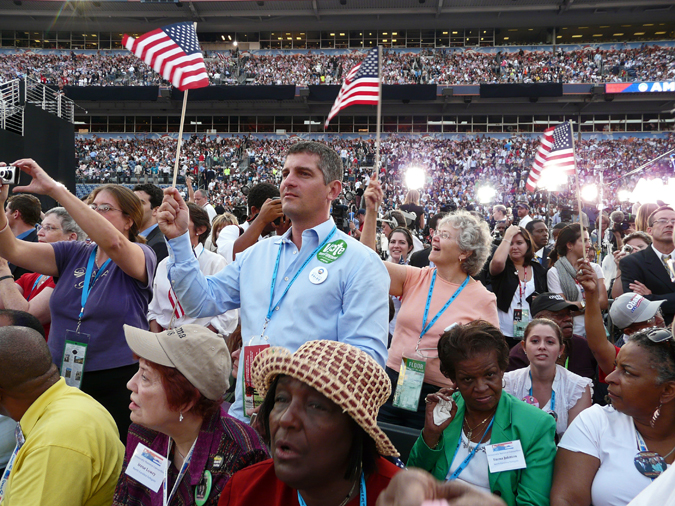
For Clinton supporters like Mike Nelson (blue shirt) and Nancy Park (salmon blouse), turning their support to Obama was an emotional and not-at-all consistent process.
Tuesday night’s speech laid that to rest for him. “It was a call for all women — ‘fight the sexism’ — and I really took that to heart,” he said. “It made me so proud of everything she has done, not just for the party, but for every woman who has aspired to be a doctor, lawyer, CEO or president of the United States.”
Talking with Clinton delegates afterward, Verdejo concluded that the New York senator’s speech was the catharsis they needed to embrace Obama. “They finally came to the conclusion that it’s time to put our house together,” he said.
For Clinton delegates, though, this proved an emotional and not-at-all consistent process, even after Clinton released them from their commitments. Wednesday morning, Nancy Park of Chapel Hill signed a document voting for Obama, but she wept as she did it and her hand trembled so much that she messed up her signature. “I’ve been a feminist since the beginning,” she said. “I was in a women’s consciousness-raising group back in ’66 or ’67. A woman was going to potentially be the president. I wanted that to happen.” On the other hand, Park feared that any show of disunity would undermine the Democrats this fall. After polling some Clinton supporters back home, she concluded, “The issues were more important than the candidate.”
Not everyone backed Obama in the convention balloting: Of North Carolina’s 138 delegates, 23 voted for Clinton. That’s about half the delegates who had started the week pledged to the former First Lady. “My grandmother was born before women had the right to vote,” said Orange County Commissioner Mike Nelson of Hillsborough. “She was one of three women reporters for The New York Times in the 1930s, and she faced real workplace discrimination. I struggled with wanting to demonstrate party unity. But I wanted to vote for my grandmother and my mother and my niece.”
VERDEJO AND I PLANNED TO GO TO AN immigrant-rights march and rally Thursday, the last day of the convention. I had mentioned it earlier, and he pounced on the idea. The combination of Latino issues and fresh air was too irresistible to pass up.
That morning, he came up to me at the delegation breakfast. “Dude, I’m going to be on the floor tonight,” he said.
“That’s great, John,” I replied.
“You’re not hearing what I’m saying. I’m going to Be. On. The. Floor.” Verdejo had just received an invitation from the Obama campaign to sit in a barricaded section of Invesco Field, a few feet from the podium where the Illinois senator would accept the nomination. Joining him and a few dozen others would be Joe Biden and Michelle Obama. Verdejo had no idea why he was singled out.
Verdejo needed to secure new credentials, so I went to the immigration march alone. It started near Invesco Field and ended at Lincoln Park, a leafy square next to a public-housing project where laundry hung from communal lines suspended over dusty, well-trodden lawns.
There were more than 800 people, some carrying giant puppets, an inflatable Statue of Liberty, and a 40-foot-long U.S. Constitution. Their signs said “No More Deaths in the Desert” and “Stop the Border Wall.” Food Not Bombs handed out vegan burritos. A Native American group opened the rally with a ceremonial dance.
Among the organizers’ demands was the passage of the federal DREAM Act, which would enable young immigrants to attend college even if, as children, they entered the United States illegally with their families. They would qualify for student loans and work-study programs, but not other federal assistance. After two years of college, they could petition for permanent residence. Among the bill’s 11 introducers are Sens. Obama and John McCain.
The DREAM Act taps into one of the hottest political issues in North Carolina. Last month, the State Board of Community Colleges affirmed its longstanding and unusually restrictive policy of barring the admission of undocumented residents. The board wants to examine how other states deal with the issue.
Over the week, I talked with a half dozen of the state’s delegates about this. Every one of them supported opening the community colleges to all North Carolinians. “We should not run around penalizing young folks who happened to land here with their parents,” AFL-CIO state president James Andrews told me after one delegation breakfast. He was standing with Secretary of State Elaine Marshall, who said, “I don’t think a 2-year-old can illegally immigrate here.”
That’s a sharp contrast to the rhetoric of the state’s top Democratic candidates. Lt. Gov. Bev Perdue, who is running for governor, has led the effort to keep undocumented residents out of the community-college system. “I’m against allowing illegal immigrants who can never work legally in North Carolina to attend community colleges in North Carolina,” she said last month. And U.S. Senate candidate Kay Hagan recently aired a TV commercial stressing her opposition to issuing drivers’ licenses to the undocumented. (I couldn’t find a single delegate who agreed with Hagan on this point. “These kids are here because of no fault of their own,” Marshall said. “I want them to know the rules of the road.”)
Some delegates were reluctant to criticize their party’s standard-bearers, but not everyone was so reticent. “It’s disappointing to see Democratic candidates attack a minority constituency,” said delegate Ian Palmquist of Raleigh. “It’s not necessary and it’s not strategic.”
Verdejo feels passionately about this issue. As Puerto Ricans, his relatives moved to the mainland from a U.S. territory, making them citizens. But “we still feel for our brothers and sisters,” he said during our first Denver interview. He held out his bronze-colored arm. It was the same color of much of the hotel staff that bustled around us. “We’re good for some things but not for others,” he said.

Georgia Jacquez Lewis, chair of the Mecklenburg County Board of Elections: “Some [undocumented] students are valedictorians. And they’re going to be here. We might as well educate them.”
At the rally, I ran into Colorado delegate Sonya Jacquez Lewis, who used to live in Durham and worked to unseat Republican Sen. Jesse Helms in 1990. She told me how her state’s progressive Democrats were solidly behind efforts to offer higher education to the undocumented.
She introduced me to her mother, Georgia Jacquez Lewis, who lives in Charlotte and chairs the Mecklenburg County Board of Elections. Until recently, the elder Jacquez Lewis also sat on the board of Carolina Piedmont Community College, where she championed universal admission. I asked her about Perdue’s stance. “I don’t like it at all, and I have let her know that,” she said. “Some of these students are valedictorians. And they’re going to be here. We might as well educate them.” On the other hand, she said, “I can understand [Perdue’s] point of view. She has to get elected.”
THURSDAY NIGHT, THE NORTH CAROLINA DELEGATION scored prime seats on the ground level of Invesco Field: far enough back to avoid the crush, but close enough to watch Obama accept the nomination as if from the 25th row of an auditorium. As political theater, holding the final session in a football stadium was brilliant: It broke the boxed-in grid of every convention I’ve attended and gave the evening a singular-moment-in-history feel (which it was). I only wished there wasn’t a huge electronic billboard displaying Obama’s Web site address and, in much larger letters, the logo for Verizon Wireless.
Without Verdejo’s Latin energy to whip them up, the state’s delegation was considerably more sedate — at least until the end of the evening, when the nominee walked on stage. His acceptance speech was soaring and substantive. It showcased his presidentiality. He delivered it with depth and grace.
Afterward, as the fireworks ended and the streamers settled down to the field, I made my way down to the barricade and called out to Verdejo. He was wearing a pinstriped jacket with a French blue shirt. He looked overwhelmed.
“How was it?” I asked.
“Emotional, man.” Verdejo said that Obama came across as more than a statesman: “He makes you look at who you are, find your faults, correct them and move on.” As Verdejo listened to Obama’s story — about the senator’s mother who would wake him at 4:30 a.m. to study — he thought about his own impoverished beginnings. Now he was sitting with the leaders of his party. “Who would have though I’d have made it?” he asked.
“It’s funny: The whole time I’m here, I’m getting tons and tons of text messages saying, ‘Yo, John, I seen you! I seen you on CNN.’ My sister, who I don’t talk to that much, called me from the Bronx. Boys from high school, who I hadn’t spoken to since 10 years ago, since I graduated, called me out of the blue. ‘Yo, John, I’ve seen you on TV, man! I didn’t know you were doing that!’ If this right here doesn’t make you want to go out and do something” — he paused and chuckled — “you don’t deserve to be around, man.”
Verdejo stopped talking. He reached his arms out, burrowed his head into my shoulder and wept. “It made think of everything I need to do,” he said — “as a person, as a man, and just to make sure Barack Obama sees the White House. It sounds strong, but to me, it’s like the Second Coming.”
More from the 2008 Democratic National Convention

